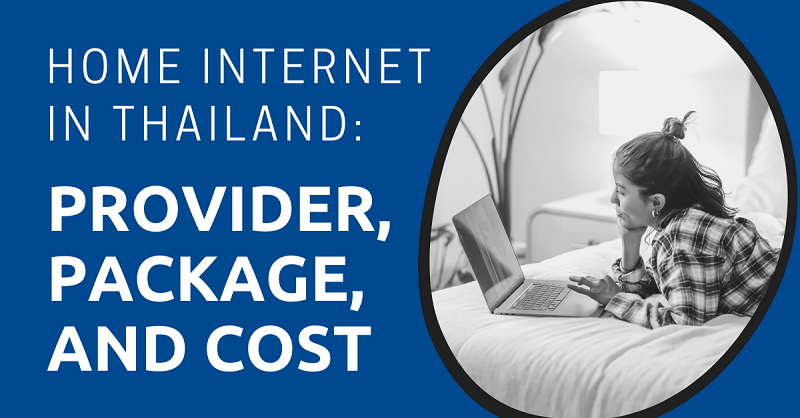
Choosing a home internet provider in Thailand can be a complicated and confusing process, with a whole host of companies fighting for your attention with flashy deals and promotions.
In this article, we’ll talk you through the process of choosing a home internet provider in Thailand, from which providers offer the best speed and stability to what kind of add-ons you can expect.
We’ll also showcase some of the alternatives on offer in Thailand, from public wi-fi to satellite internet.
Note, however, that we won’t be delving too deeply into mobile internet here – for more on that topic, check out our article on choosing a Thai SIM card.
If you want more insider tips, check out ExpatDen Premium. It contains hundreds of pieces of exclusive content to make your new life in Thailand a breeze including:
- Tips on Preparing Documents for Thailand Visas
- How to Find a Great Expat-Friendly Company to Work For
- A Full Checklist on What to Bring When Shipping to Thailand
- Getting Deals and Discounts on Your Daily Life
- How to Get Great Medical Treatment at Affordable Rates in Thailand
- How to Negotiate Your Rent Down by 40%
- and much more…
"*" indicates required fields
Disclaimer: This article may include links to products or services offered by ExpatDen’s partners, which give us commissions when you click on them. Although this may influence how they appear in the text, we only recommend solutions that we would use in your situation. Read more in our Advertising Disclosure.
Contents
Coverage
Internet coverage is pretty extensive in Thailand. Fibre-optic internet accounts for around 95% of all home internet connections, with everywhere but a few remote rural pockets able to access it.
This means that unless you live in a very remote area, there shouldn’t be a problem installing an internet at your place.
Speed and Stability
Internet in Thailand tends to be fast and stable enough to make it a tempting hub for digital nomads.
Home internet packages start at 200 mpbs/200 mpbs download/upload speeds. Making Thailand ranks within the top ten worldwide when it comes to an internet speed. (sixth in the world according to Speedtest).
When it comes to stability, it’s very stable. From personal experience living in Thailand for almost a decade, I can confirm that it’s very rare indeed for a connection to drop.
Cost
Home broadband packages from the Big Three start from around THB399 per month, ranging up to THB1299 per month, depending on what you need.
However, the best value package is likely that offered by TOT, who offer a (fairly basic) package for just THB300 per month.
Internet Providers in Thailand
Thailand’s largest and most popular internet providers are AIS, True and Dtac, also known as the ‘Big Three’.
You can find their branches in just about any of the country’s malls, or their SIM cards filling the shelves of your nearest 7/11.
However, they aren’t the only game in town – smaller companies like 3BB and TOT also offer competitive packages. Let’s run through each provider offers:
AIS
AIS (it stands for Advanced Info Service, in case you were wondering) is Thailand’s largest mobile phone operator, with around 40 million customers.
AIS offer both mobile internet packages and home fibre internet, as well as a host of other services including payment processing (under the mPay brand), wi-fi hotspots and multi-platform entertainment (AIS Play).
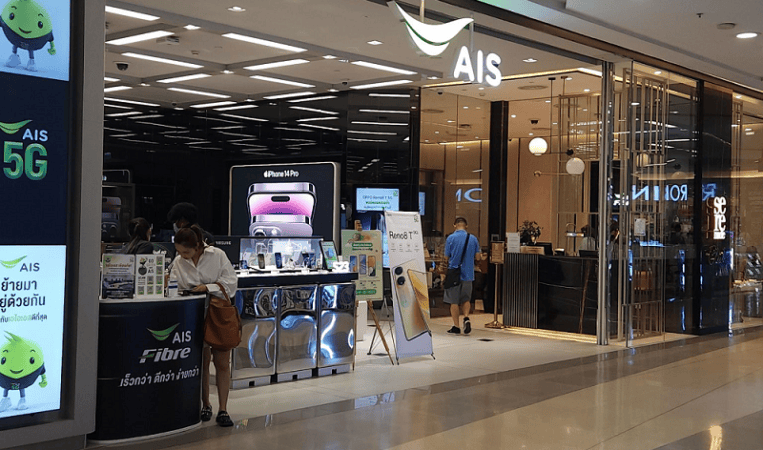
AIS’s fibre service is very good – it was voted the best home broadband service in the Asia Pacific region back in 2020.
AIS’s BYOD Package – which allows you to use your own router – is the cheapest available package at present, coming in at THB399 per month for download/upload speeds of 500 Mbps/500 Mbps.
However, professionals may want to consider the Serenade package, which offers a max download/upload speed of 2 Gbps/500 Mbps for THB1699 per month, plus other goodies. All of AIS’s Fibre packages are also capable of supporting internet TV, home phones lines and security cameras amongst others.
AIS is currently leader of the pack in many areas – fastest connections, widest coverage (AIS mobile users can get a 4G signal 93% of the time), greatest stability and most widely-available public wi-fi. However, they can be a little pricier than their competitors.
3BB
3BB has been around for a long time, once trading under the name TT&T. They’ve been offering competitive home internet packages since 2009.
While not quite up to the standards of the Big Three, 3BB still boasts extensive network coverage across the country.
3BB offers home internet under the Giga Fiber brand. Packages begin at 1 GBPS/100 Mbps download/upload speeds for a reasonable THB590 per month, rising up to THB1200 per month for 1 Gbps/1 Gbps download/upload speeds for serious users.
Whilst 3BB are an economical choice compared to their competitors, their coverage is currently a little lacking compared to the Big Three.
True
True is an enormous communications conglomerate, covering everything from mobile internet to coffee shops and shopping malls. Their cable TV service, TrueVisions, is the country’s largest and their mobile service (TrueMove H) is second only to AIS in size.
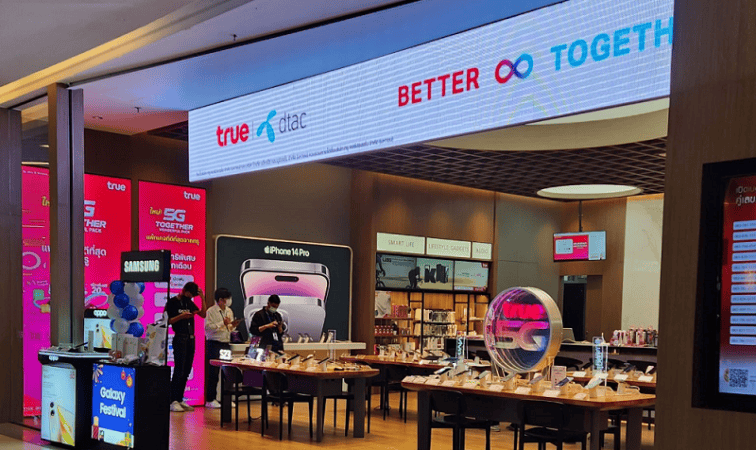
True offers home fibre internet through the Gigatex ProLife brand. Their packages start at THB599 per month for download/upload speeds of 500 Mbps/500 Mbps (reduced to THB399 per month for TrueMove H customers), going up to THB1399 per month for download/upload speeds of 2 Gbps/500 Mbps, with a bunch of other goodies such as Premier League matches and TrueVisions cable thrown in to sweeten the deal.
True’s packages provide more bang-for-your-buck than AIS, and they also tend to sweeten the deal with the most extensive add-ons (SIM cards, subscription TV packages etc).
However, they are edged out a little by AIS in terms of speed, stability and coverage.
TOT
Thailand’s state-owned telecommunications company, TOT also offer some decent home internet packages. Possibly the oldest company in this list, TOT date all the way back to 1954 – although it’s fair to say their internet wing is a little more modern.
TOT’s home fibre packages start at THB290 per month for 100 Mbps/100 Mbps download/upload speeds, topping out at THB900 per month for 1000 Mbps/1000 Mbps download/upload speeds.
Be warned, however – TOT’s website appears to be Thai-language only, which may not make it an ideal choice for non-Thai speaking expats.
Dtac
Rounding out the Big Three is Dtac. Officially trading under the slightly less-snappy name of Total Access Communication Public Company Ltd., Dtac’s logo will be familiar to Scandinavians as that of Norwegian phone company Telenor.
This is no coincidence, as Telenor both directly and indirectly owns Dtac. The company is currently going through a merger with True, which would make it one-half of the largest mobile network provider in Thailand.
Traditionally a mobile company, Dtac got into the home internet game fairly recently with their Dtac@Home scheme, which essentially sets you up with a 4G router at home. Packages begin at THB399 per month for a basic 100GB, rising up to THB899 for 500 GB.
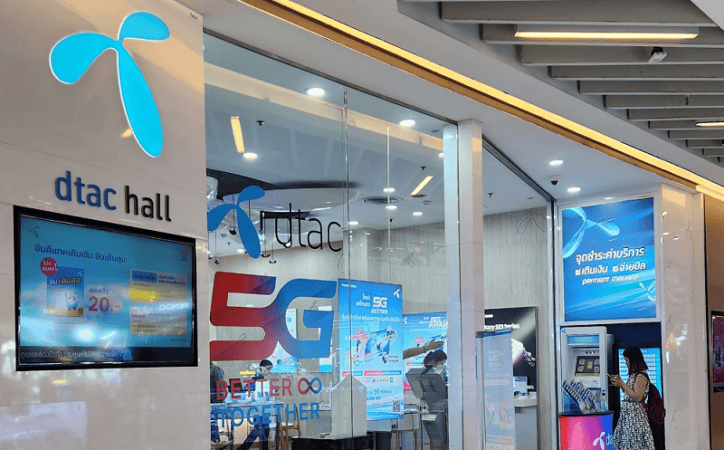
However, it’s not a fibre internet. So, a speed can be quite low at 10 Mbps to 20 Mbps.
On the plus side, Dtac@Home is a neat way of getting a solid internet connection without having to rely on fiddly cables. However, it might be a little too slow for those who need fast internet for gaming or streaming.
Packages
Not sure which package is for you?
Here we’ll break down the fibre packages each provider offers and the cheapest available package at that speed, as well as what extra add-ons you can expect with each.
Package Comparison
Prices shown are on a per-month basis. We’ve decided to leave Dtac off the chart because they do not currently offer fibre internet.
| Download/Upload | 500/500 Mbps | 1 Gbps/100 Mbps | 1 Gbps/200 Mbps | 1 Gbps/500 Mbps | 1 Gbps/700 Mbps | 1 Gbps/1 Gbps |
| AIS | THB399 | – | – | THB599 | – | – |
| 1 | THB599 | – | THB699 | THB799 | – | THB1299 |
| 3BB | – | THB590 | – | THB700 | THB900 | THB1200 |
| TOT | THB490 | – | THB590 | THB700 | THB900 | THB1200 |
Add-Ons
The bigger providers will frequently bundle their internet packages in with a bunch of extras to entice you to buy. By bundling several services together, you can often reduce the cost of paying for each service separately. However, the downside is that once you’ve signed up for one of these subscriptions it can be a pain to cancel it.
Some common add-ons include:
TV
As Thailand’s largest cable TV provider, most of True’s internet packages also come with a TrueID TV box.
This may include just the basic channels or the full package – with extras such as Premier League games – depending on how much you’re willing to pay for your subscription.
AIS also offer their AIS Play streaming service as an add-on to some of their packages, which includes channels such as Paramount, CNN and Nickelodeon. Some packages also include the Disney Plus streaming service, which is a big draw for many.
3BB’s Giga TV Package comes with a cable box and a subscription to HBO Go.
SIM Cards
Almost all of True’s internet packages come with a free 4G/5G SIM card for a flat-fee per month – some even come with two! Many of AIS’s packages also contain an AIS SIM card – for example, the AIS Power Advance 4 Package comes with a 5G SIM.
Free Wi-fi
Some providers offer wi-fi connections in many public spaces for their customers, such as in malls or chain restaurants.
You can get a password as part of some of their packages – simply log-in wherever you see it offered. Currently AIS offers the most extensive free wi-fi package.
Installation
Once you’ve chosen your provider, it’s time to get your internet installed. Almost all the providers mentioned above will have branches in most of the country’s bigger malls, and these branches will usually have English-speaking staff so it’s simply a case of showing up and asking.
For most providers, you’ll need to show evidence that you’re staying in Thailand long-term (e.g a passport with a Non-Immigrant visa and/or work permit) if you wish to have the account fall under your name.
You may also have to show a copy of your house registration book (tabien baan) and/or your current rental contract, depending on the provider. Minimum contracts are often a year, so providers like to see some evidence that you’re not going to drop off the face of the earth before your contract is up.
Once you’ve signed up for a package, installation is usually fast and professional – the whole process of setting up internet at home should take within a few days. (In my case, True took just two days for the installation).
Some providers may ask for a one-off installation fee or deposit at 2,000 baht to 3,000 baht.
The modem is often provided for free if you stay with them for at least 12 months.
Alternative Options
If setting up a router at home isn’t an option for you, there are alternatives. These include:
Phone Data
5G was rolled out back in 2020, and now covers around 85% of the country – about the only places you can expect a drop in service are in some of the more remote national parks.
Because of this, mobile data is quickly becoming fast enough to cover all your basic internet needs.
SIM cards with mobile data from the ‘Big Three’ providers (AIS, True and Dtac) range from just THB49 up to THB1500 per month, depending on the package you want.
These same providers also offer a number of pre-paid tourist SIMs of similar price, which are available in most larger 7/11 stores. These are inexpensive pay-as-you-go SIMs which last for a short set time (say around 7 days), which should be more than enough if you’re just here for a holiday or need something to tide you over while you wait for a home connection.
AIS provides the best coverage at present, with users able to access a 4G connection in Thailand 93% of the time, with TrueMove coming in second.
Public Wi-Fi
Most restaurants, coffee shops, bars etc. will provide a free wi-fi connection, particularly the big chains such as Starbucks – although do note that due to Thai legal requirements you frequently have to register first.
Wi-fi is a little less common in public spaces such as malls or train stations. The bigger airports such as Suvarnabhumi offer free wi-fi for a limited time only (normally around two hours), but it’s less common at smaller regional airports.
Most trains or buses do not currently provide wi-fi, so you’ll have to rely on your data while travelling.
But when you use a public wi-fi, you should be careful on digital security. You definitely do not want connect to your confidential data such as mobile banking when connecting to public wi-fi.
Adding additional protection with a VPN is also a good idea.
Read more: The Complete Guide To Picking The Best VPN For Thailand
Pocket Wi-Fi
You might see these little gadgets available at airport phone shops. As the name suggests, Pocket Wi-fi devices are small (pocket-sized, even) devices which provide you with a 4G wi-fi signal.
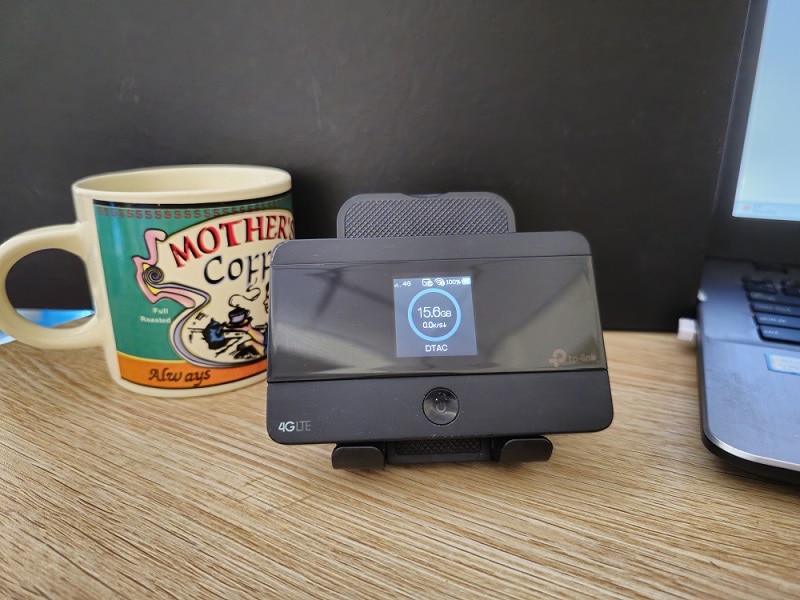
These are normally rented out rather than sold, as the initial outlay is a little too much for most casual travellers (around THB3000).
Ultimately, we can’t really recommend getting a pocket wi-fi device. Not only are they adding unnecessary weight to your pockets, they also tend to be more expensive on a per-day basis than a simple SIM card would be.
However, if your roaming plan is less-than-ideal and you can’t switch out your SIM card, it may be a potential option.
High Speed Wireless
One exciting new development is that of high-speed wireless.
Currently offered by True under the Wireless Hi-Speed brand, high-speed wireless uses the fibre network to provide extra-fast wi-fi – essentially as fast as a home fibre connection, but available almost everywhere.
Coverage is currently a little limited, but hopefully there will be further roll-outs in future.
True Wireless Hi-Speed packages start at THB29 for one hour’s usage, going up to THB169 for seven days (fourteen days for TrueMove H Double Data users).
Satellite Internet
If you’re planning to live in a remote area, satellite internet may be an option. Thaicom are one of the bigger providers, offering 30 Mbps of download speed via the IPSTAR satellite broadband network.
It’s expensive at the moment. A basic package costs THB1900 per month for 10/2 Mbps.
It goes without saying that you’re unlikely to get lightning-fast speeds via satellite, and it’s only really practical if you plan to stay somewhere without mobile or fibre coverage (and that’s a vanishingly small part of Thailand, as any coverage map will reveal).
Now, on to You
All things considered, AIS are currently the market leaders when it comes to internet in Thailand. They boast the fastest speeds, most extensive coverage and the best value-for-money.
However, other companies such as True might have the edge when it comes to add-ons, particularly the TV packages.



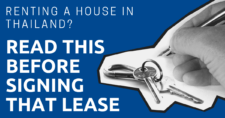


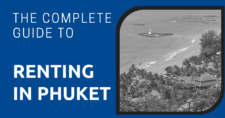

Hi! Is there any installation fee beside monthly fee and deposit for router? ^^
My landlord is offering the 500baht package with 1000 installation fee, do you think it is too expensive? Should I contact to set up with the provider on my own? ^^ Thanks!
The 1000 baht installation fee sounds okay. In case you contact an internet provider and opt for a yearly contract, they will not charge for a router deposit and installation fee, but they may charge an initial fee.
Thanks! Your article is super helpful!!!